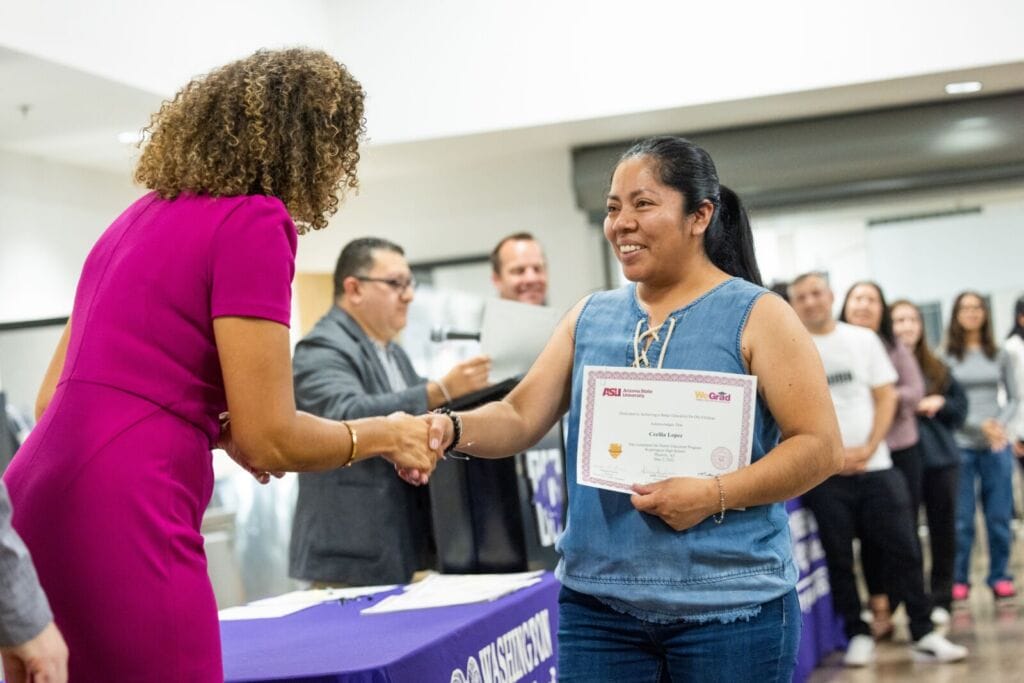In the past 4 years, college enrollment in Arizona has fallen from 55.3% of high school graduates to 47.3%. In 2021, only 6.5 million male students enrolled in a postsecondary institution whereas 8.9 million women enrolled. Add in the absenteeism epidemic in America’s classrooms, which rose from 6.5 million to 14.7 million in just three years and the problem seems almost insurmountable. Yet, the value of education still holds, so despite the trends, it’s never too early to talk to kids about college.
GOOD READ: 17 inventions that haven’t been invented yet (that people want)
Professionals who have completed post-secondary education, whether a certificate, license, or degree, contribute to a more robust local economy, enjoy individual prosperity and see reduced social spending.
For example, increasing the postsecondary enrollment rate in Arizona by 20% would lead to gains — including lifetime earnings, improved health, reduced crime and welfare spending, and increased workforce productivity.
Yet, with all this in mind, approximately 25% of high school graduates in Arizona who are eligible do not go to community college or a four-year university.
What can we do to change these statistics?

Parents are our first teachers
One possible solution is to start raising a new generation of students who want to take advantage of the many benefits only higher education can offer. This plan won’t begin in the classroom, however. Passion for education first begins in our homes; parents are our children’s first teachers and play an essential role in developing interest in post-secondary schooling even earlier than one might think. While most of these discussions are left to the last two years of high school, studies show that earlier discussions have a greater influence on a child’s later enrollment in a four-year academic institution.
As children develop, they learn what their parents value and often adopt similar viewpoints. Homes that present learning and education as exciting, useful and valued, have more engaged and successful students. The idea that through education, one can better understand current events, develop strong study habits, find and pursue a career and gain power through knowledge learned is a key message parents can continue to share with their kids throughout development
However, not all parents see the value of education. Perhaps they did not have the means to attend college themselves, or a job was prioritized over college because money was scarce. Whatever the reason, parents often wish they would have had more support from their family to pursue higher education and hope to do it differently with their own kids.
Students whose parents stay involved in school have better attendance and behavior, get better grades, demonstrate better social skills and adapt better to school.
Join in college readiness programming
Access ASU, a K-12 outreach division at Arizona State University (ASU) dedicated to increasing access to higher education, has developed thoughtful programming to support parents and assist families in discussing higher education preparedness and degree attainment with their young children.
One of these such programs, WeGrad, provides a series of lessons for elementary, middle school and high school parents that teaches them how to reinforce the value of education, understand their role in academic success and prepare their student for college.
If it truly takes a village, then it makes sense to invite the whole village into the conversation. Families can now be the educated voice in how to accomplish the necessary tasks so their children can be prepared for postsecondary education. They can become a part of the financial preparedness and the expert on next steps to help guide their students to successfully enroll at the college of their choice.

Continue conversations and share what you’ve learned
Parents can start having conversations about college with their children prior to joining college readiness programs like those offered by Access ASU. Many experts recommend starting these conversations as early as kindergarten. When in elementary school, children might be more open to talking about the links between their schoolwork and what they want to do when they finish school. Beginning these conversations early helps to build a foundation of trust and interest and is then easier to carry on as your child begins adolescence and adulthood.
Some possible topics include:
- Becoming an advocate for your child by opening lines of communication with their teacher, principal and support staff, especially in elementary school.
- Teaching responsibility to help your student achieve academic success during formative middle school years.
- Developing goals to assist high school students in meeting admission requirements in a timely fashion.
As kids develop, the discussions can certainly become more complex and build upon the foundational knowledge already shared. The goal is to make education, and a trusted relationship between parent and child, the cornerstones of painting a successful future together. To help shape your child’s educational future, enroll in WeGrad today. With a curriculum delivered via text messages suited for elementary, middle and high school families, it’s a simple and efficient way to support your student’s academic journey. Visit WeGrad.asu.edu/digital to sign up or learn more.
Author: Alex Perilla is Director of Family Programs at Access ASU.




